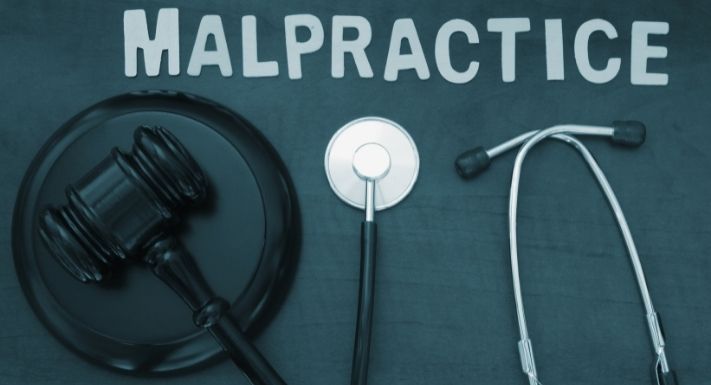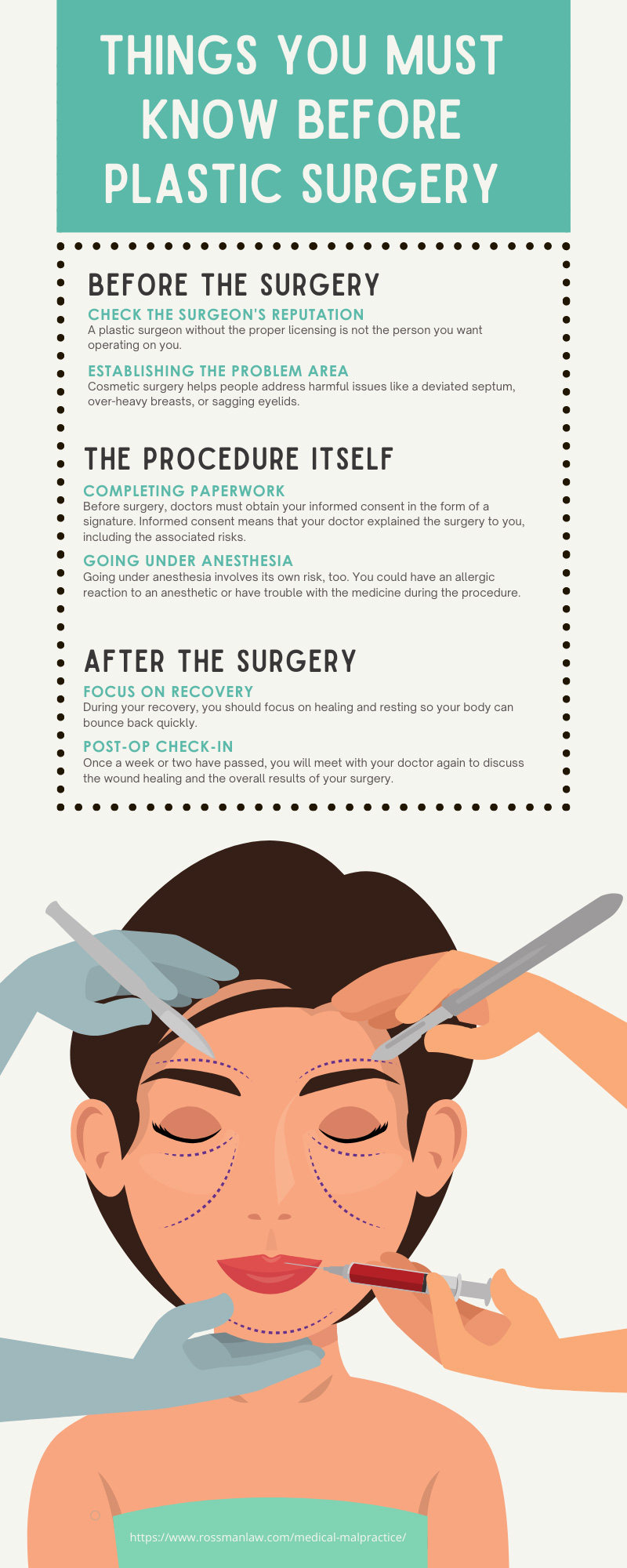
How To Cope With a Wrongful Death in Your Family
May 6, 2021
What Is Considered Hospital Negligence
May 18, 2021Plastic surgery is an incredible modern medicine that allows people to reconstruct their bodies as they wish. Whether you want to reshape your nose or erase frustrating wrinkles, cosmetic surgeons can alter your appearance through medical interventions. If you are planning to undergo a procedure, here are the most important things you must know before plastic surgery.
Before the Surgery
Prior to any surgery, it is crucial to meet with the doctor and decide what part of your body you wish to alter. Plastic surgery is not a simple process, so you must make sure the doctor knows what you want and how to make it happen.
Check the Surgeon’s Reputation
It is a sad reality that many doctors who perform plastic surgery do not have the specific licensure to do so. Many medical professionals believe that their other training is sufficient to perform cosmetic surgery. While this is true to an extent, a plastic surgeon without the proper licensing is not the person you want operating on you.
You must check the qualifications and reputation of the plastic surgeon before choosing them for your surgery. If you don’t, you could end up with medical problems resulting from their lack of knowledge. You should ask around and see if previous patients are happy with their results. If you read bad reviews online or hear consistently bad impressions of that doctor, you should definitely look elsewhere.
Establishing the Problem Area
Cosmetic surgery is all about changing a problem area on your body. In popular culture, many people consider plastic surgery as a preferential choice taken for beautification. While this is true in some cases, cosmetic surgery also helps people address harmful issues like a deviated septum, over-heavy breasts, or sagging eyelids.
Suppose you want your eyelids lifted. You could be aging with droopy eyelids that prevent clear sight, or you could wish to work against this sagging preemptively. Either way, you must describe the exact area you want the surgeon to work on. If they go too far or don’t go far enough, they could leave you with more frustrating eyelid complications than you previously had. With a clear direction, you and your surgeon can make the most of the procedure.
Setting Expectations
While cosmetic surgery should permanently fix the problem at hand, it is not the perfect panacea people want. You and your surgeon should establish realistic expectations for the procedure and plan future surgeries if the process takes time. After a procedure, the operation site may become inflamed or sore. This is totally normal, and you should expect swelling after an invasive surgery. So, do not expect to have perfectly sculpted lips minutes after a lip augmentation.
The Procedure Itself
Before you go under, it is essential to know how a plastic surgery operation happens. If you are unaware of your surgeon’s specific actions, you may not know the possible complications, either.
Completing Paperwork
Before surgery, doctors must obtain your informed consent in the form of a signature. Informed consent means that your doctor explained the surgery to you, including the associated risks. It is important to note that medical risks are serious, and you should not dismiss them out of hand.
You might have a strong desire to complete the surgery and make it happen, but you should not ignore the possible complications or infections. You should take some time to weigh the decision with all factors in mind before signing your consent form. Plastic surgery is an elective surgery, so do not pass over this detail lightly.
Going Under Anesthesia
Depending on the scope of the operation, you will most likely go entirely under anesthesia. When doctors cut open parts of the body, it is easiest when the patient is sedated and cannot feel a thing. Going under anesthesia involves its own risk, too. You could have an allergic reaction to an anesthetic or have trouble with the medicine during the procedure. Make sure you understand the full extent of the operation and what it will require of you.
After the Surgery
Surgery is a major medical event and should not be taken lightly, especially in the immediate aftermath. Your doctor will likely want to watch over you for a time before letting you go home, just in case you have an adverse reaction.
Focus on Recovery
Recovery is the time after your surgery before you go home wherein the doctor watches your healing process. You will first awaken out of your anesthesia and gain full consciousness. At this point, you will probably feel the surgery site pulsing and hurting—after all, you did just get cut open on the operating table. During your recovery, you should focus on healing and resting so your body can bounce back quickly.
Post-Op Check-In
After the operation and recovery, you will go home and continue to rest and recover. Though you are not in the same vulnerable state as during recovery, you should be careful with your movements and wound care. Once a week or two have passed, you will meet with your doctor again to discuss the wound healing and the overall results of your surgery. This is your opportunity to mention any unusual pains or feelings you’ve had since the surgery.
Developments and Complications
We all hope that every surgery will go off without a hitch. However, this is not always the case. Surgeons are not perfect and can make mistakes that complicate your medical situation. If you experience a life-threatening complication after plastic surgery, you should consider legal action. Medical malpractice is a serious offense, and you should not take it lightly.
When you plan your cosmetic procedure, remember these things you must know before plastic surgery. At the heart of every successful surgery is communication. When your doctor tells you all about the surgery and shares all your post-op issues, you can head off problems before becoming severe. However, it is impossible to avoid harm if your surgeon is at fault. If you have any questions about surgical error, reach out to us at Rossman Law Group to speak with a medical malpractice attorney in Boise, ID.






